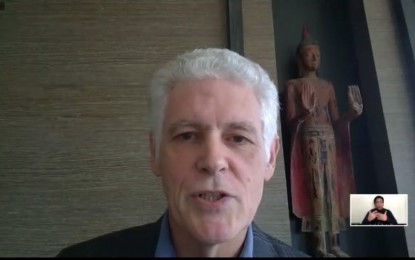
JOB SUMMIT. Asian Development Bank (ADB) Philippines country director Kelly Bird delivers his message of support during the Task Group on Economic Recovery-National Employment Recovery Strategy (TGER-NERS) Job Summit on Labor Day (May 1, 2021). ADB is extending USD3.5-billion loan to the Philippines this year mainly to fund infrastructure programs. (Screenshot from Job Summit online meeting)
MANILA – After supporting the Philippine government’s program to fight coronavirus disease 2019 (Covid-19), the Asian Development Bank (ADB) will focus its financing program in the country to accelerate job generation.
During the Task Group on Economic Recovery-National Employment Recovery Strategy (TGER-NERS) Job Summit on Labor Day, ADB Philippines country director Kelly Bird said the institution has a USD3.5-billion lending program for the Philippines this year mainly supporting infrastructure projects that will create construction and related jobs.
Bird said infrastructure projects that will be funded by ADB this year include the Malolos-Clark Railway Project, the South Commuter Railway Project, the Davao Modern Bus Project, the Metro Manila Bridges Project, and the Palawan Sustainable Tourism Project.
“Our own estimates show that USD1 billion of infrastructure investments create an additional USD1.5 billion in gross domestic product,” he said.
He added these infrastructure projects will help in the economic recovery and employment in the country.
Bird said the ADB has also partnered with the Department of Labor and Employment (DOLE) and the Technical Education and Skills Development Authority (TESDA) to reskill Filipino youth for their transition to the job market.
“This includes DOLE’s flagship program JobStart Philippines that has helped more than 20,000 out-of-school young Filipinos find meaningful employment,” he added.
Bird said ADB aims to support the Philippine government in these programs that will help in easing the elevated unemployment rate and increasing the number of workers in the informal sector due to job shedding amid the pandemic.
“(T)he Build Build Build infrastructure program, tax reforms, regulatory reforms, and by sector reforms places the Philippines in very good position to return to its economic growth of above 6 percent,” the ADB executive said.
Last March, ADB has approved USD400-million worth of loans for the Philippine government’s Covid-19 vaccination program.
Bird added that in 2020, ADB provided institutional financing amounting to USD4.2 billion for the Philippines.
Of last year’s ADB funding for the Philippines, the executive said USD1.8 billion went to the government’s fiscal and health response, and USD10 million was for the establishment of a modern laboratory in San Fernando City, which can process 3,000 Covid-19 tests per day.
In partnership with the Department of Social Welfare and Development and the Armed Forces of the Philippines, food baskets were provided to over 160,000 vulnerable households, or 600,000 individuals, in Metro Manila during the enhanced community quarantine last year.
Bird said ADB has also provided a grant to procure education kits to poor children in remote areas to help them while face-to-face learning is restricted.
“As a host country, ADB remains committed to support the Philippines get through this pandemic and return to high economic growth and job creation,” he said. (PNA)
